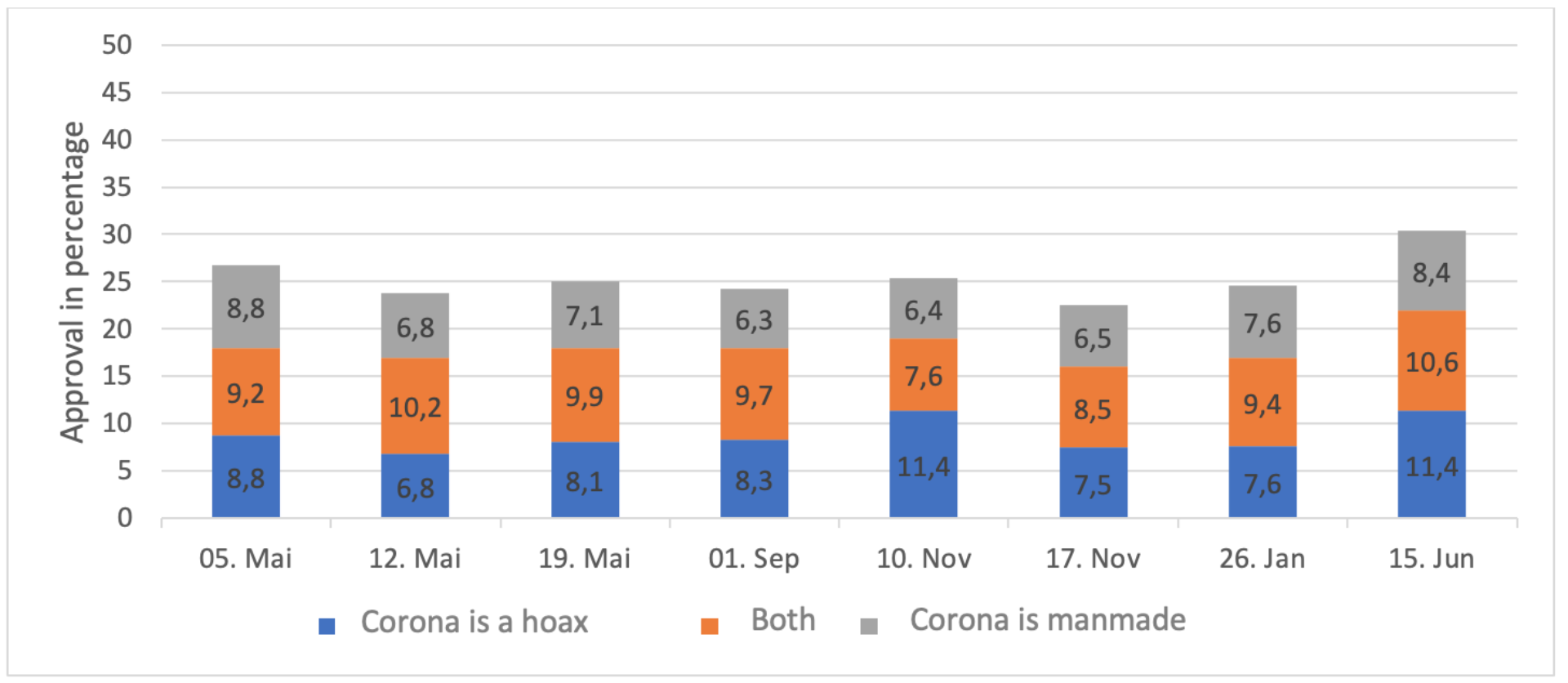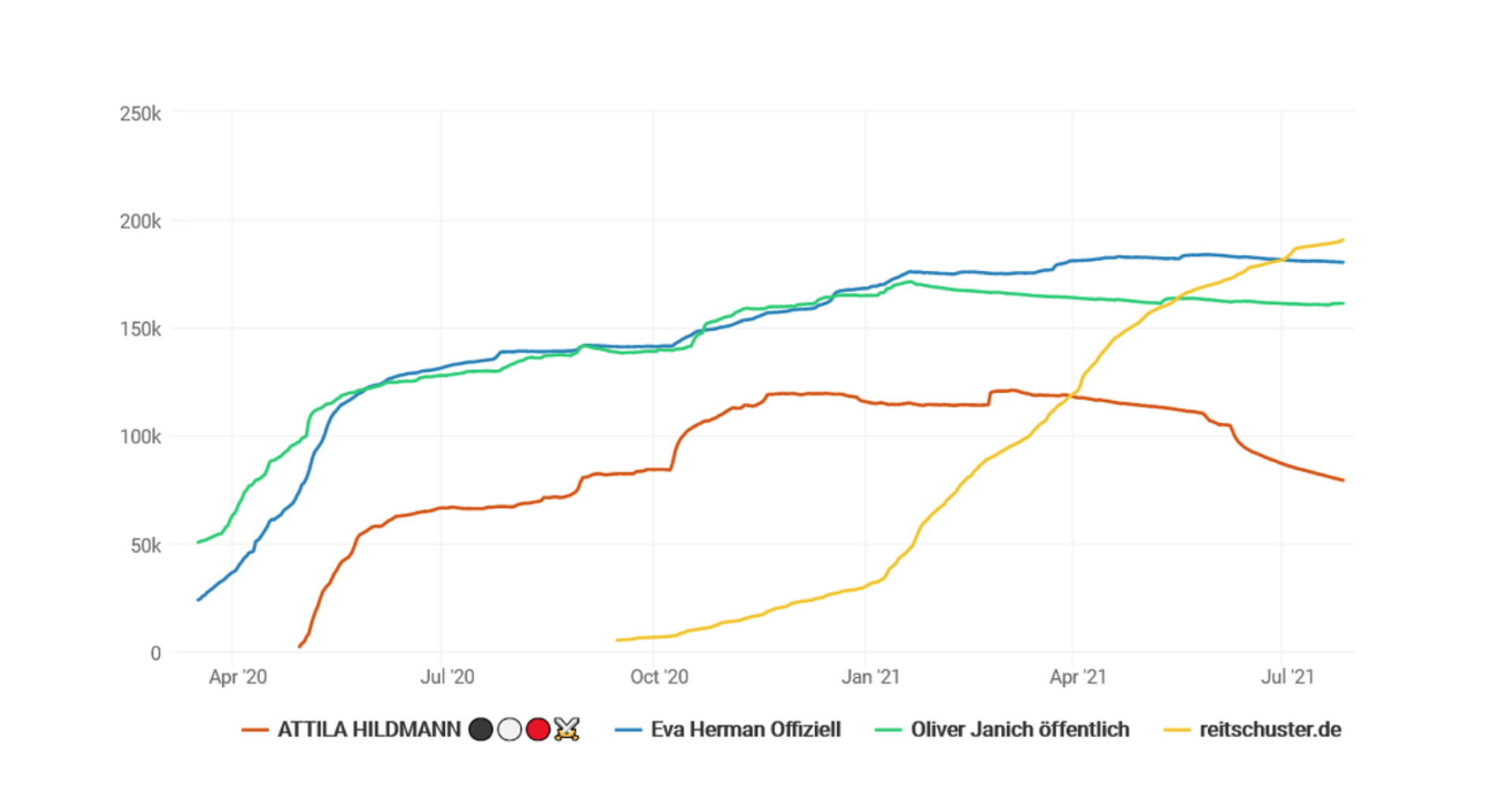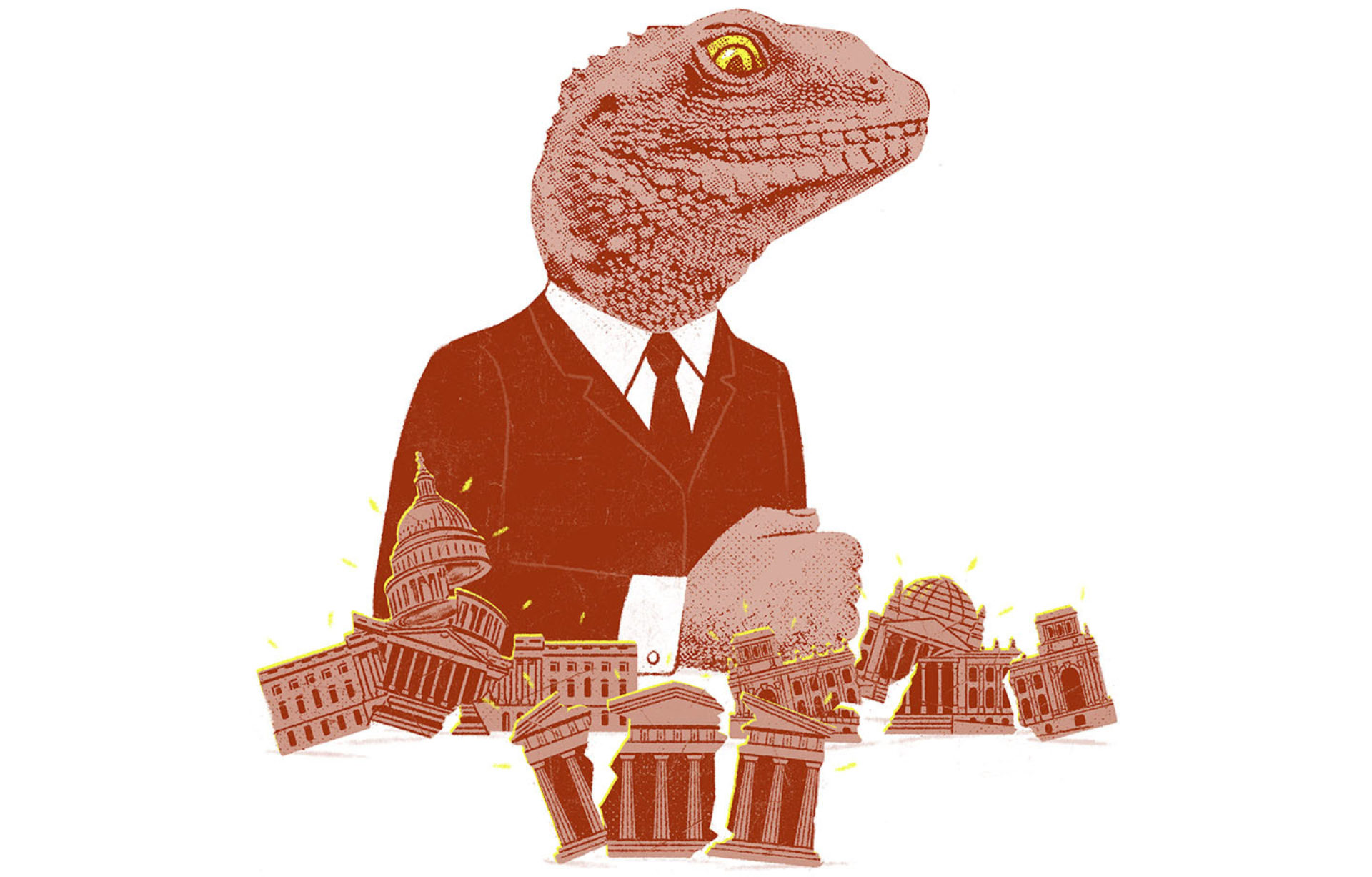The COVID-19 pandemic has made it abundantly clear that misinformation and disinformation, together with conspiracy narratives, can have a deleterious effect on crisis and disaster management, as well on social interaction. These challenges will not disappear with the pandemic. Thus it is necessary to develop strategies for dealing with them.
Conspiracy narratives and the COVID-19 pandemic
COSMO – the COVID-19 snapshot monitoring program - has been surveying attitudes and behaviors amongst Germans since the beginning of the pandemic. Within the framework of these surveys, the intensity of human tendencies to believe in conspiracy myths during the pandemic is also measured. To this end, two mutually exclusive narratives are proposed: Either the pandemic is a hoax (“Experts are deliberately pulling the wool over our eyes to their own advantage, even though this virus is actually no worse than an influenza”) or the coronavirus is manmade (“Corona was brought into the world on purpose, to reduce the human population.” Betsch et al., 2020).

The datashow that slightly more than 20% and up to 30% of the population is receptive to these ideas. Two results stand out here: First of all, about 10 percent agree with both narratives, even though they are not logically compatible. This is a recurring finding in psychology. What may seem irrational at first glance is actually indicative of a stable worldview. Those who strongly believe in conspiracies think that what “they” are saying just can’t be true (Wood, Douglas, & Sutton, 2012). And secondly, even more than a year into the pandemic, which has claimed the lives of at least 90,000 people in Germany alone according to the RKI, more than one in five people Germany doubt the very existence of the disease, or suspect that it is deliberately portrayed as dangerous in order to mislead the general public.
These results are hardly surprising when compared with international research conducted prior to the pandemic. In the USA, one in two citizens believes in at least one conspiracy narrative (Oliver & Wood, 2014). The so-called Mitte Study concluded in 2019 that one in three people in Germany has an affinity for conspiracy thinking (Rees & Lamberty, 2019). Thus, since belief in conspiracies was not purely a product of the pandemic, it will not simply disappear once the pandemic is over.
Conspiracy narratives as a threat to democratic society?
One might conclude that belief in conspiracies is just one of many forms of misperception to which humans are prey. All of us have believed from time to time in notions that are false. Cognitive biases are widely investigated in psychology, and they are part of everyday life. But this argument ignores the fact that by now there is now a large body of research that clearly shows belief in conspiracies exacts a toll on society. Those who see secret powers at work everywhere withdraw from democratic processes and seek alternatives (Imhoff, Dieterle, & Lamberty, 2021). The stronger their belief in conspiracies, the more they promote violence in order to realize their (political) goals (Rees & Lamberty, 2019). Antisemitism is inherent to conspiracy narratives (Kofta, Soral, & Bilewicz, 2020). This is revealed also in the uptick in antisemitic incidents during the pandemic. Those with a pronounced tendency to believe in conspiracies consider all the powers-that-be to be enemies. This applies equally to governments, financial institutions and media. During the so-called protests from conspiracy ideological or right-wing circles against governmentally proscribed measures to curb the coronavirus, there were so many attacks on representatives of the press that the European Center for Press and Media (ECPMF) warned of a danger to freedom of the press in Germany.
Misinformation and conspiracy narratives also have hindered management of the COVID-19 pandemic. Various studies have shown that belief in conspiracies corresponds with a reduced readiness to be vaccinated and to follow other measures introduced in an effort to curb the pandemic (Imhoff & Lamberty, 2020). This is particularly troubling, considering the high rates of approval of conspiracy narratives in society. Research also reveals that even people who do not believe in conspiracies can lose confidence in their decision to be immunized through confrontation with conspiracy ideological content (Jolley & Douglas, 2014).

During the pandemic the messaging service Telegram has become a central platform for conspiracy ideologies and right-wing extremist figures. Via Telegram this milieu networked and organized demonstrations and disseminated local flyers with disinformation on the pandemic and vaccination. One can also purchase counterfeit vaccine identification cards from this platform, as was revealed in an investigation by CeMas. The conspiracy followers target individuals and institutions (such as virologists and researchers, but also individual Jews), and they espouse violence. Time and again they employ revisionist historical comparisons, suggesting that in particular people working in the health branch and in science will have to answer to “tribunals” or to a “Nuremberg 2.0.” Since Telegram rarely rejects content, it continues to offer the ideal platform for criminals, right-wing extremists and terrorists around the world.
Literature
Betsch, C., Wieler, L., Bosnjak, M., Ramharter, M., Stollorz, V., Omer, S., Korn, L., Sprengholz, P., Felgendreff, L., Eitze, S., Schmid, P. (2020). Germany COVID-19 Snapshot Monitoring (COSMO Germany): Monitoring knowledge, risk perceptions, preventive behaviours, and public trust in the current coronavirus outbreak in Germany, http://dx.doi.org/10.23668/psycharchives.2776
Douglas, K. M., Sutton, R. M., & Cichocka, A. (2017). The psychology of conspiracy theories. Current directions in psychological science, 26(6), 538-542.
Imhoff, R., & Lamberty, P. (2020). A bioweapon or a hoax? The link between distinct conspiracy beliefs about the Coronavirus disease (COVID-19) outbreak and pandemic behavior. Social Psychological and Personality Science, 11(8), 1110-1118.
Imhoff, R., Dieterle, L., & Lamberty, P. (2021). Resolving the puzzle of conspiracy worldview and political activism: Belief in secret plots decreases normative but increases nonnormative political engagement. Social Psychological and Personality Science, 12(1), 71-79.
Jolley, D., & Douglas, K. M. (2014). The effects of anti-vaccine conspiracy theories on vaccination intentions. PloS one, 9(2), e89177.
Kofta, M., Soral, W., & Bilewicz, M. (2020). What breeds conspiracy antisemitism? The role of political uncontrollability and uncertainty in the belief in Jewish conspiracy. Journal of Personality and Social Psychology, 118(5), 900.
Lamberty, P., & Imhoff, R. (2018). Powerful pharma and its marginalized alternatives?. Social Psychology.
Lamberty, P., & Imhoff, R. (2021). Verschwörungserzählungen im Kontext der Coronapandemie. Psychotherapeut, 1-5.
Oliver, J. E., & Wood, T. J. (2014). Conspiracy theories and the paranoid style (s) of mass opinion. American Journal of Political Science, 58(4), 952-966.
Rees, J., & Lamberty, P. (2019). Mitreißende Wahrheiten: Verschwörungsmythen als Gefahr für den gesellschaftlichen Zusammenhalt. In Verlorene Mitte-Feindselige Zustände. Rechtsextreme Einstellungen in Deutschland 2018/19.
Wood, M. J., Douglas, K. M., & Sutton, R. M. (2012). Dead and alive: Beliefs in contradictory conspiracy theories. Social psychological and personality science, 3(6), 767-773.
Literature
Betsch, C., Wieler, L., Bosnjak, M., Ramharter, M., Stollorz, V., Omer, S., Korn, L., Sprengholz, P., Felgendreff, L., Eitze, S., Schmid, P. (2020). Germany COVID-19 Snapshot Monitoring (COSMO Germany): Monitoring knowledge, risk perceptions, preventive behaviours, and public trust in the current coronavirus outbreak in Germany, http://dx.doi.org/10.23668/psycharchives.2776
Douglas, K. M., Sutton, R. M., & Cichocka, A. (2017). The psychology of conspiracy theories. Current directions in psychological science, 26(6), 538-542.
Imhoff, R., & Lamberty, P. (2020). A bioweapon or a hoax? The link between distinct conspiracy beliefs about the Coronavirus disease (COVID-19) outbreak and pandemic behavior. Social Psychological and Personality Science, 11(8), 1110-1118.
Imhoff, R., Dieterle, L., & Lamberty, P. (2021). Resolving the puzzle of conspiracy worldview and political activism: Belief in secret plots decreases normative but increases nonnormative political engagement. Social Psychological and Personality Science, 12(1), 71-79.
Jolley, D., & Douglas, K. M. (2014). The effects of anti-vaccine conspiracy theories on vaccination intentions. PloS one, 9(2), e89177.
Kofta, M., Soral, W., & Bilewicz, M. (2020). What breeds conspiracy antisemitism? The role of political uncontrollability and uncertainty in the belief in Jewish conspiracy. Journal of Personality and Social Psychology, 118(5), 900.
Lamberty, P., & Imhoff, R. (2018). Powerful pharma and its marginalized alternatives?. Social Psychology.
Lamberty, P., & Imhoff, R. (2021). Verschwörungserzählungen im Kontext der Coronapandemie. Psychotherapeut, 1-5.
Oliver, J. E., & Wood, T. J. (2014). Conspiracy theories and the paranoid style (s) of mass opinion. American Journal of Political Science, 58(4), 952-966.
Rees, J., & Lamberty, P. (2019). Mitreißende Wahrheiten: Verschwörungsmythen als Gefahr für den gesellschaftlichen Zusammenhalt. In Verlorene Mitte-Feindselige Zustände. Rechtsextreme Einstellungen in Deutschland 2018/19.
Wood, M. J., Douglas, K. M., & Sutton, R. M. (2012). Dead and alive: Beliefs in contradictory conspiracy theories. Social psychological and personality science, 3(6), 767-773.
Grappling with conspiracy narratives in society
For societies, dealing with conspiracy narratives proves as challenging as dealing with populist movements. Germany offers ever more counseling opportunities for individuals, but on the societal level there is a paucity of strategies. Tools for dealing with disinformation and conspiracy narratives are essential to managing crises or catastrophes. This was underscored again through the mobilization of right-wing extremist and conspiracy ideologies during the catastrophic flooding in North-Rhine Westphalia and Rhineland-Palatinate.
A sensible strategy on and off line has three parts:
1. Support for those affected: Both right-wing extremist and conspiracy ideological milieus regularly mobilize, threaten and harass individuals. Society needs an adequate and rapid response from security authorities, and it needs to empower civil society organizations such as HateAid that support victims as they negotiate through their experience. But support for those affected is also a task for every individual – whether they present counter arguments or report (or lodge formal complaints) with Internet platform operators and the police.
2. Strengthening civil society: An active civil society is a central building block against anti-democratic movements. An essential aspect is the negotiation of red lines, including a clear position against antisemitism or conspiracy ideological content. This establishes social norms to which people can orient themselves and their behavior. The red lines are therefore the very best prevention against further radicalization in those groups that, while they have an affinity to conspiracy myths, have not developed a full-blown ideology.
3. Punishment of hate and incitement: Hate and incitement, particularly in the digital realm, have not been taken seriously enough. This has become clear again in recent months through the case of the popular vegan TV and restaurateur chef Atilla Hildmann. Digital hate has real consequences. Slowly, society and security authorities are beginning to grasp the serious nature of this threat.
Conclusion and outlook
The issue of conspiracy narratives, as with misinformation and disinformation, will be with us worldwide even after the pandemic, adding to the difficulties of resolving conflicts in the realms of health care, in elections, or in dealing with natural catastrophes. Long-range strategies are more important than ever when dealing with major societal challenges like the climate emergency. Given the instrumentalization of this topic in particular, it is more urgent than ever to develop and implement such strategies.
Pia Lamberty is co-director of CeMAS together with Josef Holnburger, and as a psychologist has been studying for years why people believe in conspiracies, and what the consequences of these worldviews are. Her research has taken her to the universities in Cologne, Mainz and Beer Sheva (Israel). Lamberty stands at the crossroads of research and society, and provides evidence-based explanations about conspiracy myths, disinformation, antisemitism and right-wing extremism. Co-written with Katharina Nocun and published in May 2020, her book, “Fake Facts – Wie Verschwörungstheorien unser Denken bestimmen” (How conspiracy theories determine our thoughts) was a Spiegel Magazine bestseller. In 2021 she and Nocun published “True Facts – Was gegen Verschwörungserzählungen wirklich hilft” (What really works against conspiracy myths.” In 2020 she received the Bad Herrenalber Academy Prize for her research.
The Alfred Landecker Foundation is the exclusive founding sponsor of CeMAS and its Landecker re|con project.



